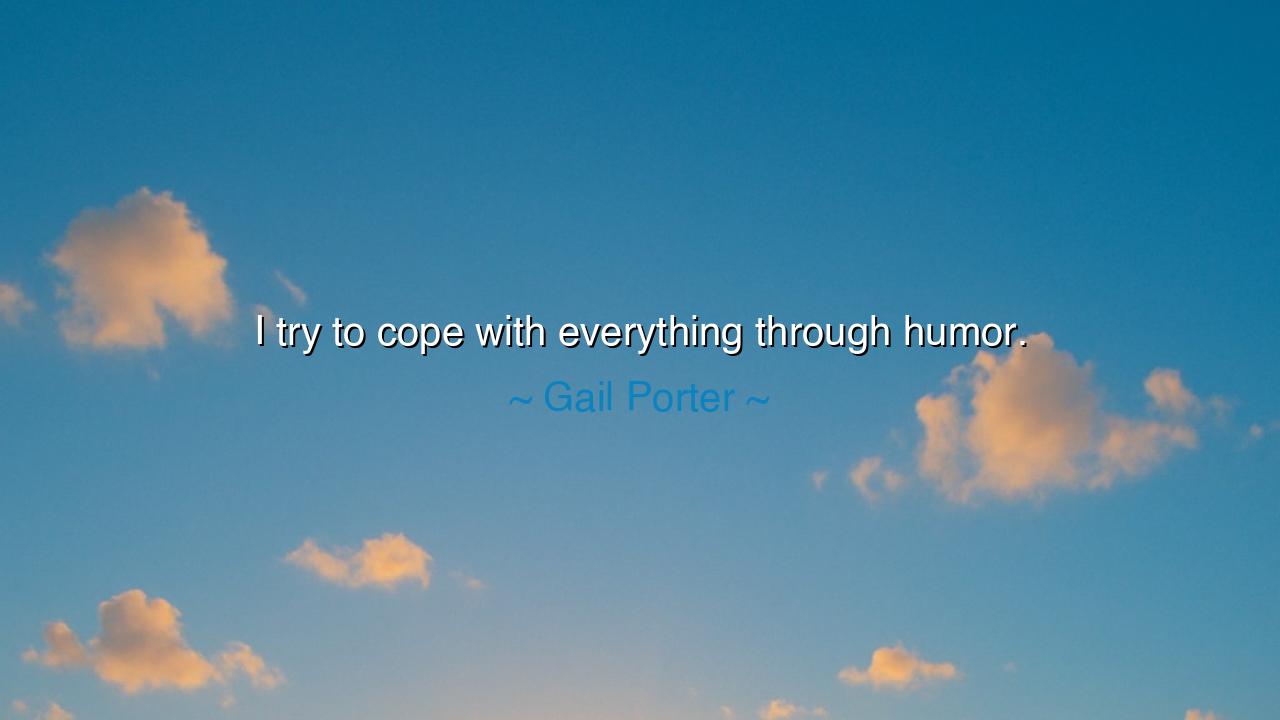
I try to cope with everything through humor.






When Gail Porter said, “I try to cope with everything through humor,” she was not offering a mere statement of personality — she was revealing a sacred survival strategy. Beneath her gentle words lies the spirit of one who has walked through the valley of despair and found light not in denial, but in laughter. Her quote is a song of resilience, an acknowledgment that life’s storms cannot always be stopped, but they can be softened by the warmth of humor. To cope through humor is to declare, “I have suffered, but I will not surrender my joy.” It is to wield laughter as both shield and medicine, transforming pain into something bearable, even beautiful.
Gail Porter’s life lends gravity to her words. Once a beloved television presenter, she faced public scrutiny, mental illness, and alopecia, which took from her what the world prizes so deeply — her hair, her image, her sense of control. But rather than allow grief to silence her, she chose humor as her companion. She laughed not because life was easy, but because she refused to let pain define her. Her laughter became an act of rebellion — a gentle but unyielding defiance against despair. Through humor, she reclaimed her power, reminding us that joy is not the absence of sorrow, but the courage to smile in its presence.
The ancients knew well the sacred role of humor in healing. The philosopher Democritus, called “the laughing philosopher,” believed that laughter was wisdom’s closest ally, for it gave man distance from his suffering and freed the soul from bitterness. Even in the courts of kings, jesters served a holy purpose: to speak truth through laughter, to remind rulers that all crowns are temporary, and that humility is the root of peace. In this way, humor becomes divine insight — a bridge between the pain of being human and the serenity of understanding it. Porter’s words belong to this lineage of the wise who have chosen laughter over lamentation, not as escape, but as enlightenment.
Consider the story of Viktor Frankl, the psychologist who survived the horrors of Auschwitz. Surrounded by death and cruelty, he and his fellow prisoners learned to make small jokes, even in the face of starvation and pain. Frankl later wrote that humor was “another of the soul’s weapons in the fight for self-preservation.” It gave the prisoners a flicker of control in a world that had stripped them of everything. Like Gail Porter, Frankl discovered that humor is the final freedom — the ability to choose one’s attitude even when everything else is taken away.
To “cope through humor,” then, is not to ignore pain, but to transform it. It is an alchemy of the spirit — turning grief into laughter, fear into absurdity, tragedy into tenderness. Humor allows the heart to breathe again when sorrow has made it heavy. It breaks the chains of shame, softens anger, and restores perspective. The one who can laugh amid suffering is not weak; they are the strongest of all, for they have learned to bend without breaking. Their laughter becomes a beacon to others still lost in the storm.
But let us not mistake humor for frivolity. True humor, as Porter and others have shown, does not mock pain; it redeems it. It requires empathy, self-awareness, and a deep love of life. The cynical laugh to avoid feeling; the wise laugh to embrace feeling fully, to acknowledge that life’s contradictions — its joy and sorrow, beauty and ruin — coexist within every heart. Humor, when born of love, becomes an act of healing for both the speaker and the listener. It reminds us that to be human is to stumble, to hurt, and yet to laugh again.
So let this be the lesson that Gail Porter’s words pass down to future generations: When pain comes, meet it with laughter — not to diminish it, but to endure it. Laugh with compassion, not cruelty. Find humor not by denying the dark, but by lighting a candle within it. When life feels unbearable, let humor be your breath, your rhythm, your refuge. For laughter, when true, does not silence sorrow — it sings above it, turning wounds into wisdom and despair into dignity.
And remember always: to laugh in the face of pain is not foolishness, but faith. It is the soul’s quiet way of saying, “I still believe in tomorrow.” In this, Gail Porter’s simple words become a timeless teaching — that no matter how heavy life becomes, the heart that can laugh remains unconquered.






AAdministratorAdministrator
Welcome, honored guests. Please leave a comment, we will respond soon